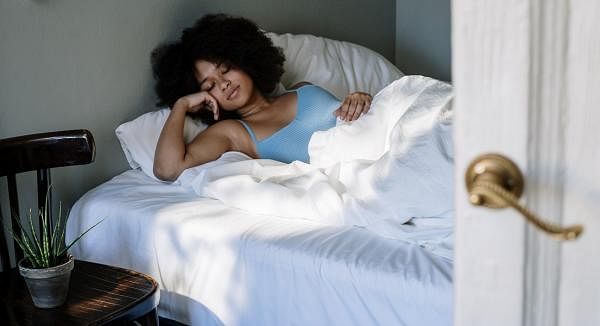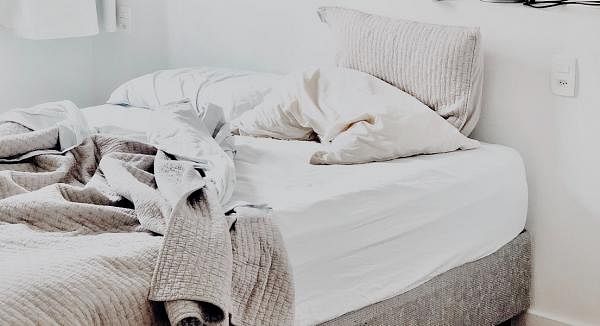Has COVID-19 Disrupted Your Sleep?
Why you can trust Nutri Advanced Every article on our site is researched thoroughly by our team of highly qualified nutritionists. Find out more about our editorial process.
Regularly getting enough good quality sleep is, without doubt, one of the most powerful ways you can support your health. And yet, at a time when we all want to do everything we can to protect our health, for many people, sleep problems have sadly been on the rise. In this article we take a closer look at how & why the pandemic has affected sleep, resources to help you get your sleep back on track and why this really needs to be made a priority right now.
The importance of good sleep
Sleep is crucial to health, safety and overall wellbeing. Good sleep supports just about every aspect of health from energy, healing, repair and detoxification to mental health and immune function. Good sleep also impacts our physical activity levels, behaviour and the choices we make on a daily basis. Sleep deprivation can impact work and relationships, impair judgement and cognitive performance. Poor sleep is linked to chronic disease risk and not surprisingly, has also been associated with increased mortality.
Pandemic effects on sleep
Sleep problems have been on the rise since the start of the pandemic – the word ‘insomnia’ was googled more in 2020 than ever before, and as early as the summer of 2020, the term ‘COVID-somnia’ was coined to describe the global impact on large numbers of people’s sleep.
In August 2020, a research team from the University of Southampton used UK survey data from 15,360 people aged 16 and above, collected during April 2020. They compared this with survey data collected in 2018/19 and found that the pandemic lockdown led to a significant rise in the number of people suffering from sleeping problems, from one in six to one in four. Females, essential workers and ethnic minority groups were amongst those most affected.1 In a systematic review and meta-analysis published in the Journal of Clinical Sleep Medicine in February 2021 researchers found the prevalence of sleep problems during the pandemic to be high, affecting approximately 40% of people from the general and health care populations. Patients with active COVID-19 appeared to have higher prevalence rates of sleep problems.2
There are a variety of different reasons why many people may have experienced sleep problems during the pandemic. Here’s some of the most common:
Change & uncertainty
Sleep can often be disrupted during periods of significant change or uncertainty, and there has certainly been a huge amount of this over the last couple of years.
Out of routine
One of the first recommendations you’d hear if you were struggling to get to or stay asleep would be to set and stick to consistent sleep/wake times because you are more likely to sleep well when you do this. Yet many aspects of people’s daily routines have changed or been inconsistent during the pandemic, including sleep routines. For many people, normal going to bed and waking up times have been disrupted, perhaps due to either being furloughed, or working or schooling from home. Since routine is so important for our sleep, it’s easy to see how the changes to, or lack of routine can quickly have a knock-on effect on quality of sleep.
Stress & fear
Sleep disturbances are commonly linked to long-term stress and the psychological impact of the pandemic has been significant, with ongoing economic and financial worries, health concerns and the psychological strain of isolation all adding up to persistent long-term stress.
Depression & anxiety
It’s not only sleep problems that have been on the rise during the pandemic, but mental health problems too. And sadly, sleep problems and mental health problems such as depression and anxiety often go hand in hand in a cruel vicious cycle.
Inactivity
Regular activity is important for good sleep and for many people, activity levels have changed over the last couple of years due to lockdowns, working from home or changes to normal exercise routines perhaps due to the closure of sports clubs or gyms.
Increased time indoors
Getting outside in daylight, especially in the morning helps to reinforce the body’s natural sleep-wake cycle. In contrast, more time spent indoors through the day, with less overall exposure to good strong outdoor daylight can disrupt the sleep-wake cycle and have a negative impact on sleep.
Alcohol
There has been a rise in alcohol consumption during the pandemic and it is well known that regular alcohol consumption can get in the way of a good night’s sleep.
Screen time
An increase in ‘virtual’ social interactions and working or schooling from home has meant significantly more time spent in front of a screen for many of us over the last couple of years. This is not good news for sleep, especially time spent in front of a ‘blue-light’ emitting screen during the evening, as this can disrupt the body’s sleep cues.
COVID-19 infection
In a systematic review and meta-analysis published in the Journal of Clinical Sleep Medicine in February 2021 researchers found patients with active COVID-19 appeared to have higher prevalence rates of sleep problems.2 Unexplained sleep problems have also been arising in some people who have recovered from COVID-19.
Why is it so important to prioritise sleep right now?
There are so many good reasons to look after your sleep, far too numerous to list here, yet there’s one that has particular significance right now. Sleep and immune health are intimately connected and we know that disrupted / insufficient sleep and work burnout have been linked to a heightened risk of infectious diseases. In a study published in the British Medical Journal in March 2021, researchers assessed whether sleep and self-reported burnout may be risk factors for COVID-19 among high-risk healthcare workers in France, Germany, Italy, Spain, UK and USA. In all six countries they found longer sleep duration to be associated with lower odds of COVID-19, and greater sleep problems and high level of burnout were robustly associated with greater odds of COVID-19.3
So how can you improve your sleep?
So we know that taking steps to improve your sleep is always a good idea, and even more so right now, but when the odds seem a bit more stacked against getting a good night’s sleep in the midst of a pandemic, it can soon start to feel overwhelming. The good news is that even despite the sleep-disruptive factors that may currently be beyond our control, there is still a lot we can take control of to improve our sleep. And moving forward with an increased awareness of just how important sleep is, hopefully means the motivation to take action has increased considerably. So what next? Take some time to look through our carefully curated sleep resources that are specially designed to help you take action and get a better night’s sleep through a series of simple steps. When’s a good time to start? As always, the best time to start is right now.
Carefully curated resources to help you get a better night’s sleep:
• How Sleep Hygiene Can Support Your Immune System
• Tired of Sleepless Nights? Here’s How The Experts Really Handle It…
• Supporting Your Circadian Rhythm
• How To Sleep Well
References:
1. Falkingham J, Evandrou M, et al. “Sleeploss in Lockdown”: unpacking differences in sleep loss during the coronavirus pandemic in the UK. medRxiv. doi: https://doi.org/10.1101/2020.07.19.20157255
https://www.southampton.ac.uk/news/2020/08/sleeploss-lockdown.page
2. Jahrami H, BaHammam A, et al. Sleep problems during the Covid-19 pandemic by population: a systematic review and meta-analysis. Journal of Clinical Sleep Medicine. Volume 17, Issue 2.
3. Kim H, Hegde S, et al. 2021. COVID-19 illness in relation to sleep and burnout. BMJ Nutrition, Prevention & Health, Volume 4, Issue 1.
This website and its content is copyright of Nutri Advanced ©. All rights reserved. See our terms & conditions for more detail.
Nutri Advanced has a thorough research process and for any references included, each source is scrutinised beforehand. We aim to use the highest value source where possible, referencing peer-reviewed journals and official guidelines in the first instance before alternatives. You can learn more about how we ensure our content is accurate at time of publication on our editorial policy.
Most Popular Articles
-
7 Surprising Ways To Support Your Magnesium
If you are displaying signs of a magnesium deficiency, here are 7 ways to boost your magnesium levels that are easy to incorporate into your daily life. -
5 Best Vitamin C Supplements Picked By Our Experts
Learn more about the different types of vitamin C, the different benefits you get from different types, and what you get for spending more on a good supplement. -
Top 5 Vitamins For Energy And Tiredness Picked By Our Experts
The 5 best and most important vitamins for energy & tiredness including B vitamin food sources & best supplement forms for energy. -
Benefits of Myo-Inositol for Polycystic Ovary Syndrome (PCOS)
In this research review article, we take a closer look at a lesser-known natural compound called myo-inositol that has been found to have significant potential to improve many of the prevalent features of PCOS. -
Top 10 Reasons to Give Your Kids Omega-3
Read the top 10 reasons that kids should have plenty of Omega-3- an essential fatty acid- including for depression, brain function, sleep & reading/maths skills.















